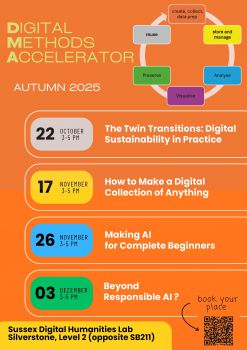SHL News
Digital Methods Accelerator Autumn 2025 programme
Posted on behalf of: Sussex Digital Humanities Lab (SHL Digital)
Last updated: Friday, 10 October 2025

Following a successful Summer Camp of taster sessions, the Digital Methods Accelerator programme (DMA) returns with an exciting set of workshops aimed at Social Sciences and Humanities researchers at all levels wanting to explore and skill up on digital methods for their research.
The Digital Method Accelerator workshops are free and open to all Sussex staff and PGR students. It is part of the Sussex Digital Humanities Lab ongoing initiatives to build digital skills and methods capacity across the humanities and social sciences. As such, it is expected the core participants to be media, arts, humanities, and social sciences researchers who want to sharpen their digital methods skills and engage critically with the fast-changing landscape of AI and digital tools. However, these sessions are open to all staff and PGR communities. No previous specialist knowledge required.
This semester we start with four workshops with the common theme of critical and creative engagement with digital technologies in research and education, and a strong emphasis on sustainability, ethics, and accessibility.
Book your place now for:
The Twin Transitions: Digital Sustainability in Practice
Delivered by: Jo Walton. Wednesday 22 October, 3-5
This hands-on workshop introduces the concept of the “twin transitions” linking digitalisation and sustainability, using the Digital Sustainability Game developed by the Digital Humanities Climate Coalition. Using playful learning, participants will explore the materiality of the digital—from cloud storage to AI tools—and the costs and opportunities for sustainable innovation. You’ll also be introduced to a range of tools and resources to explore further – from creating low carbon websites, to the thorny topic of measuring AI’s environmental impacts. No prior expertise is required, just curiosity about how the digital and green transitions shape each other. This workshop will likely also be of interest to staff and students with an interest in futures and foresight, creative facilitation, and play-based learning.
How to Make a Digital Collection of Anything
Delivered by: Sharon Webb. Monday 17 November, 3-5
Back by popular demand. Omeka is a powerful, flexible, and open-source platform for creating digital collections, archives, and online exhibits. In this introductory workshop, you’ll learn how to set up a basic site, upload materials, and curate them into thematic collections or narrative pathways. We’ll also touch briefly on creative uses of Omeka and share resources where you can find out more about metadata, copyright, and design choices that shape how collections are shared and understood. Other approaches, such as static sites using Jekyll/Hugo and GitHub Pages, will also be briefly signposted. We’ll ask: How do these approaches compare to newer generative AI tools such as Wix ADI, Durable, or Framer AI?
Making AI for Complete Beginners.
Delivered by: Shaun Ring and Paula Del Castillo Vivero. Wednesday 26 November, 3-5
Curious about how large language models (LLMs) can be adapted for your own research or teaching? Drawing on Hugging Face resources, this workshop demystifies concepts like training, fine-tuning, prompt engineering, low-rank adaption (LoRA) and Retrieval Augmented Generation (RAG), providing a beginner-friendly introduction for participants from the arts, humanities, and social sciences. We'll mainly focus on RAG, with other approaches provided as context. You’ll learn key concepts without heavy coding or mathematics. Through guided demonstrations and discussion, we’ll examine both practical applications, and also touch on questions of ethics and sustainability – and to dig deeper, we highly recommend the Beyond Responsible AI workshop as a follow-up.
Beyond Responsible AI?
Delivered by: Jo Walton and Nathalie Huegler (TBC). Monday 3rd December 3-5pm.
What does it mean to use AI responsibly in HE and research? This interactive session uses a scenario-based game to explore ethical challenges in AI, from fairness and transparency to environmental costs and labour practices. Participants will work together to navigate dilemmas, balance competing values, and reflect on the power relations that shape AI systems. The focus is on developing practical awareness and critical literacy—skills that help you ask the right questions when adopting or critiquing AI technologies. Are framings like Sustainable AI, Trustworthy AI, or Responsibly AI actually adequate, or are framings of abolition and resistance more appropriate to the requirements of justice? Should we be offering a workshop called “Responsible AI,” or rather “How To Blow Up A Data Pipeline?”
All workshops are in-person at the Sussex Digital Humanities Lab in Silverstone, Level 2 (opposite SB211). Refreshments provided.
Workshops planned for the Spring term include: Intro to Digital Humanities: Python and Web Scraping; Intro to Digital Humanities: Data Wrangling; AfroFutures Uk/ Low-Tech magazine hackathon; and more!
Book your place now using your Sussex email address: https://www.eventbrite.com/cc/digital-methods-accelerator-workshops-2025-26-4725413